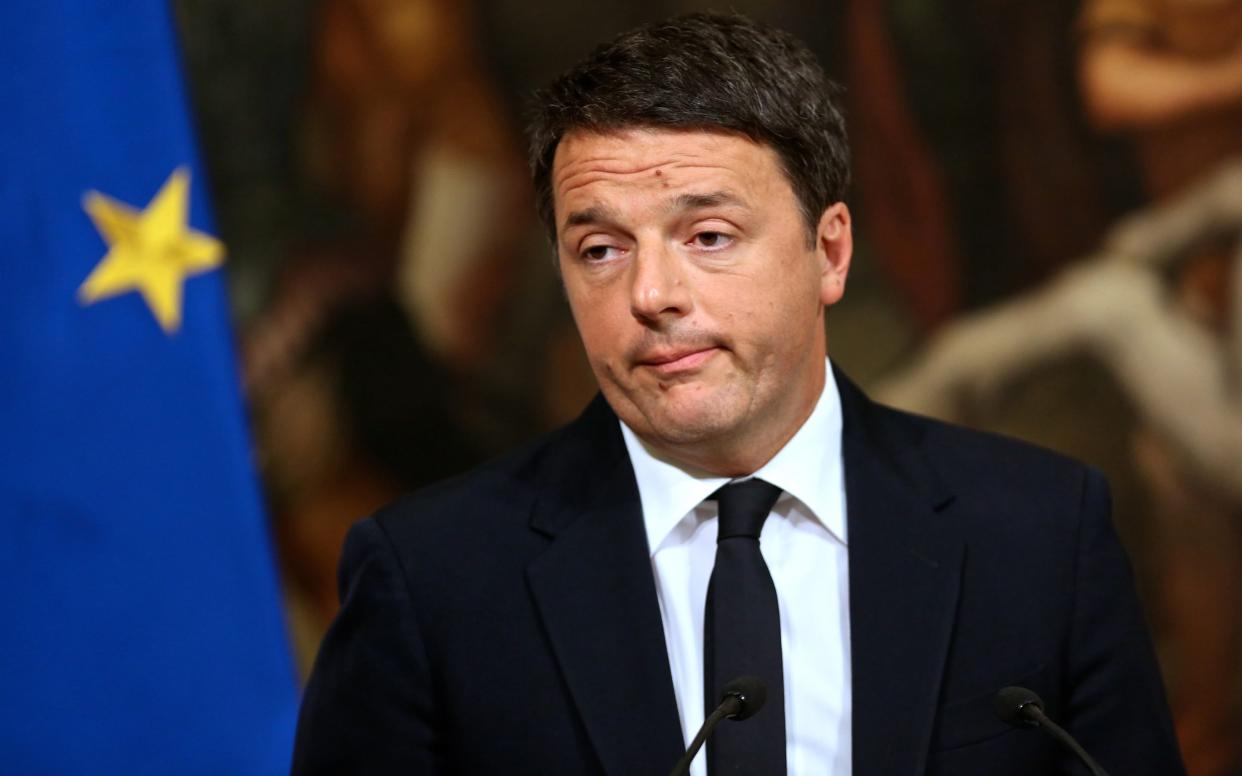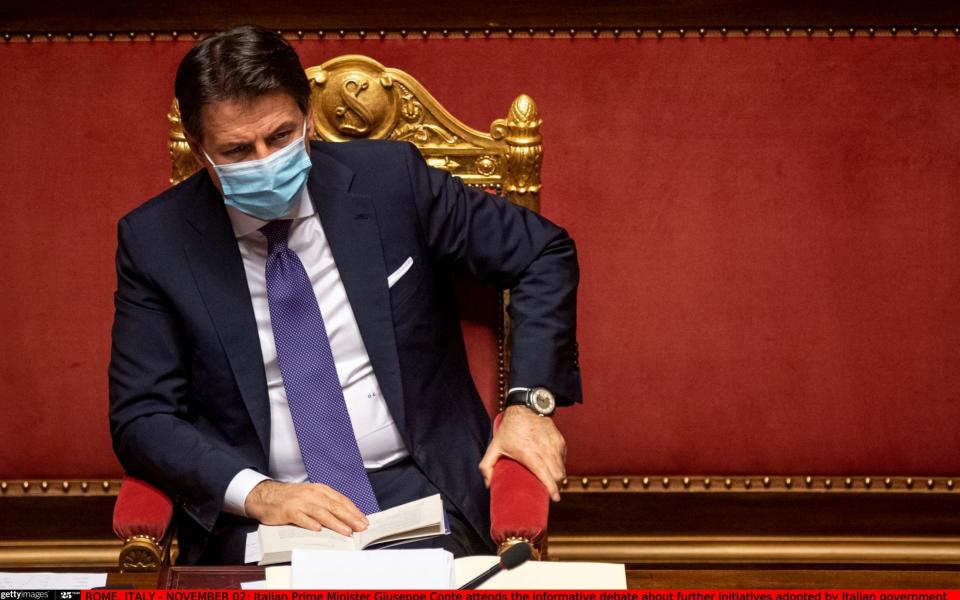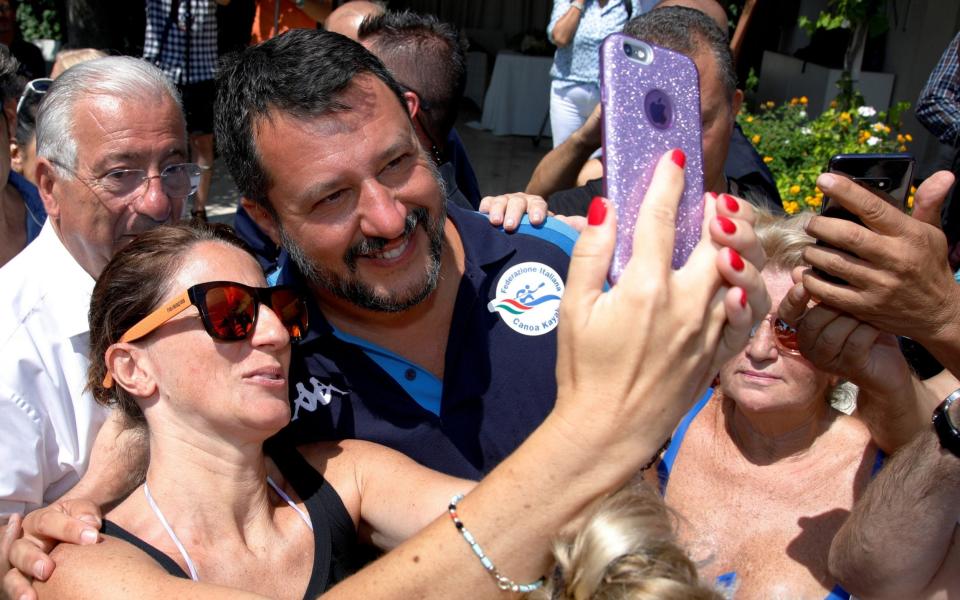Italy plunged into political crisis as ex-PM Matteo Renzi withdraws support from government

- Oops!Something went wrong.Please try again later.
- Oops!Something went wrong.Please try again later.
Italy has been plunged into political crisis after former prime minister Matteo Renzi withdrew his support from the government in the midst of the coronavirus pandemic and an acute economic collapse.
After weeks of threats, Mr Renzi announced that his centrist Italia Viva party would no longer be part of the coalition, with the party’s two ministers tendering their resignations.
The move, which was denounced as highly irresponsible by coalition MPs, analysts and much of the Italian press, could precipitate the resignation of the prime minister, Giuseppe Conte.
The political crisis came as Italy’s death toll from Covid-19 reached 80,000. The country remains in the grip of the pandemic, with another 16,000 new cases and 507 deaths reported on Wednesday.
Mr Renzi has criticised the coalition’s handling of the pandemic, with Italy registering the second highest number of deaths after the UK.

He is also at odds with the government over how to spend the €210 billion (£187 bn) that Italy has been promised by the EU to help it climb out of the economic slump caused by the pandemic.
Mr Renzi disagrees with the plan drawn up by the coalition, saying that Italy should tap into a credit line from the European Stability Mechanism, the euro zone’s bailout fund, to boost health spending.
It was “inexplicable and irresponsible” not to do so, he said during a press conference in Rome where he announced his party’s withdrawal from the coalition.
He also wants more money directed towards new infrastructure politics and objects to the appointment of a group of unelected experts who are meant to oversee the spending of the EU funds.
The Recovery Plan was approved by the cabinet late on Tuesday night, with Mr Renzi’s two ministers abstaining.
But behind the public disagreements, analysts say, is Mr Renzi’s hunger for more political power and an animosity towards Mr Conte, the technocrat prime minister, who Mr Renzi feels is not up to the job.
His rebellion was all the more pointed because it was against his former party, the Democratic Party, which governs in coalition with the Five Star Movement.

“Renzi’s plan A is to get rid of Conte, but that is difficult. So plan B is to have a new Conte government but with a bigger role for Renzi’s party,” Roberto D’Alimonte, a professor of politics, told The Telegraph.
“Renzi has just 3% of votes so he has nothing to lose. He’s gambling. He wants to regain some sort of centrality, greater visibility.
“Conte made a mistake because he side-lined Renzi and although Renzi has only 3 per cent of the vote, his support is pivotal – he has 18 senators in the upper house and 30 MPs in the lower house,” said Prof D’Alimonte, from Luiss University in Rome.
Many Italians are angry that a party that has just 3 per cent of the national vote can plunge the country into uncertainty just as a national vaccination programme is getting underway.
A poll published on Wednesday found that 46 per cent of Italians did not understand the reason for the crisis.
The Ipsos survey found that 73 per cent thought Mr Renzi was pursuing his own selfish political objectives rather than the interests of the country.
“With Italy in the grip of Covid, it seems almost incredible that we are falling into a political crisis,” said La Stampa, one of the country’s main dailies.
Earlier in the day, Roberto Speranza, the health minister, said it would be “unforgivable” to precipitate a political crisis when the country was in such dire straits.
"Let's keep political infighting, real or presumed electoral tensions, far and separate from the health of Italians," he told parliament. "It would really be an unforgivable mistake to get distracted or to slow down near the finish line."
Mr Renzi, a former mayor of Florence, was hailed as a boy wonder when he became prime minister in 2014 at the age of 39, making him the youngest premier in Italian history.
Nicknamed Il Rottamatore, or The Scrapper, he pledged to shake up Italy’s sclerotic economy and clean up the “bunga bunga” culture of showgirls and sexism left by Silvio Berlusconi.
Highly ambitious, as a boy he earned the name Il Bomba or The Bomb for his tendency to exaggerate and talk big.
As prime minister he earned a new nickname – Fonzie, after he posed for a profile in a white t-shirt and black leather jacket.
An admirer of Tony Blair, he staked everything on pushing a referendum on constitutional reform, which he lost, resulting in his resignation in 2016.
Government MPs were furious with Mr Renzi for precipitating the crisis, saying that it could play into the hands of the hard Right.
If new elections are called, a Right-wing alliance of the League, the far-Right Brothers of Italy and Silvio Berlusconi’s party could win up to 50 per cent of the vote and enter government.
Italy now enters a period of acute uncertainty in which the prime minister will consult the president, Sergio Mattarella.
Mr Conte may try to replace the 18 senators that Mr Renzi will withdraw from the coalition with senators from other parties.
“If Conte cannot replace the 18 senators, he must either give Renzi a larger role in government or face early elections,” said Prof D’Alimonte.
“No one wants an election apart from Matteo Salvini (the leader of the League) and Giorgia Meloni (the head of Brothers of Italy). But it will take two or three days for the situation to be clarified.”
Wolfango Piccoli, of the political risk consultancy Teneo, said: “Once a formal crisis is triggered, President Mattarella will act as a supreme arbiter, leading negotiations with the various parties to find a political solution.
“Given the ongoing public health and economic crisis, Mattarella will give party leaders a limited window of three to four days for talks to take place.”

